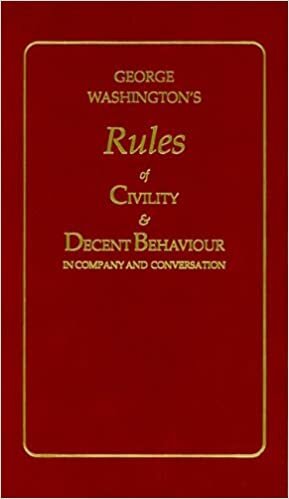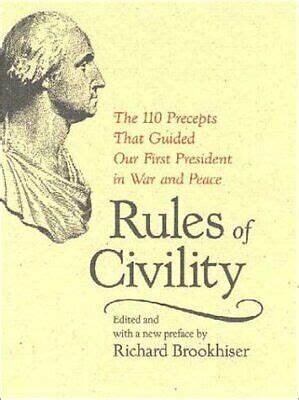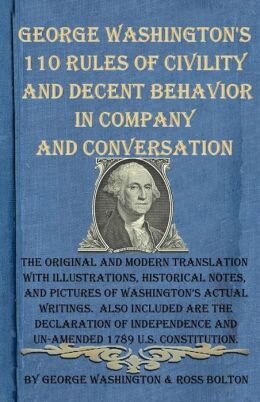110 Rules of Civility
What is Civility? According to the dictionary, it is courtesy and politeness. The Institute for Civility in Government says*, “Civility is about more than just politeness… It is about disagreeing without disrespect.” And many of us today are concerned about the lack of Civility, especially in political discourse.
We could improve civility by following George Washington’s path. As described on the Mount Vernon website, George Washington wrote out a copy of a book entitled “110 Rules of Civility” in his schoolbook when he was about 14-years old. These guidelines came from France and were popular circulated during Washington's time. This exercise is considered a formative influence in the development of his character.
Many of these are still relevant today. I have repeated 22 of the original 110 below. The original spellings are shown in the list below.
Gatherings, whether business or pleasure.
1. Every Action done in Company, ought to be with Some Sign of Respect, to those that are Present.
2. Put not off your Cloths in the presence of Others, nor go out your Chamber half Drest. (note – I wonder how that works in the world of Zoom meetings)
3. Sleep not when others Speak, Sit not when others stand, Speak not when you Should hold your Peace, walk not on when others Stop.
4. When in Company, put not your Hands to any Part of the Body, not usualy Discovered.
5. If others talk at Table be attentive but talk not with Meat in your Mouth.
Guidelines for when you are in conversation with friends or colleagues:
6. If You Cough, Sneeze, Sigh, or Yawn, do it not Loud but Privately; and Speak not in your Yawning, but put Your handkercheif or Hand before your face and turn aside.
7. Shew Nothing to your Friend that may affright him.
8. In the Presence of Others Sing not to yourself with a humming Noise, nor Drum with your Fingers or Feet. (note - Although with Zoom, you can just mute yourself)
9. Do not express Joy before one sick or in pain for that contrary Passion will aggravate his Misery.
What to say, and what not to say:
10. Superfluous Complements and all Affectation of Ceremonie are to be avoided, yet where due they are not to be Neglected.
11. Think before you Speak pronounce not imperfectly nor bring ou[t] your Words too hastily but orderly & distinctly.
12. Speak not Evil of the absent for it is unjust.
13. Be not tedious in discourse, make not many Digressigns, nor rep[eat] often the Same manner of discourse.
14. The Gestures of the Body must be Suited to the discourse you are upon.
15. Speak not injurious Words neither in Jest nor Earnest Scoff at none although they give Occasion.
Personal values:
16. Gaze not on the marks or blemishes of Others and ask not how they came. What you may Speak in Secret to your Friend deliver not before others.
17. Associate yourself with Men of good Quality if you Esteem your own Reputation; for 'tis better to be alone than in bad Company.
18. Be not hasty to beleive flying Reports to the Disparag[e]ment of any.
19. Undertake not what you cannot Perform but be Carefull to keep your Promise.
20. Let your Recreations be Manfull not Sinfull.
21. A Man o[ug]ht not to value himself of his Atchievements, or rare Qua[lities of wit; much less of his rich]es Virtue or Kindred.
22. Labour to keep alive in your Breast that Little Spark of Ce[les]tial fire Called Conscience.
Next Steps
We could all learn from George Washington’s character. As Thomas Jefferson said about him, “…never did nature and fortune combine more perfectly to make a man great…” Perhaps we should all emulate Washington and go home, and handwrite, in our best penmanship, these 110 rules.
And then attempt to live by them.
Notes:
(for a complete list of the 110 rules, click here)
*Yes, there is an Institute for Civility in Government, click here for its website.



